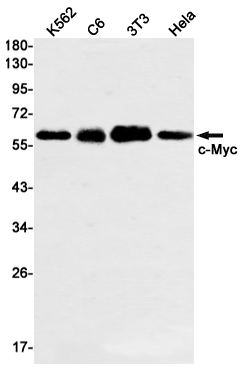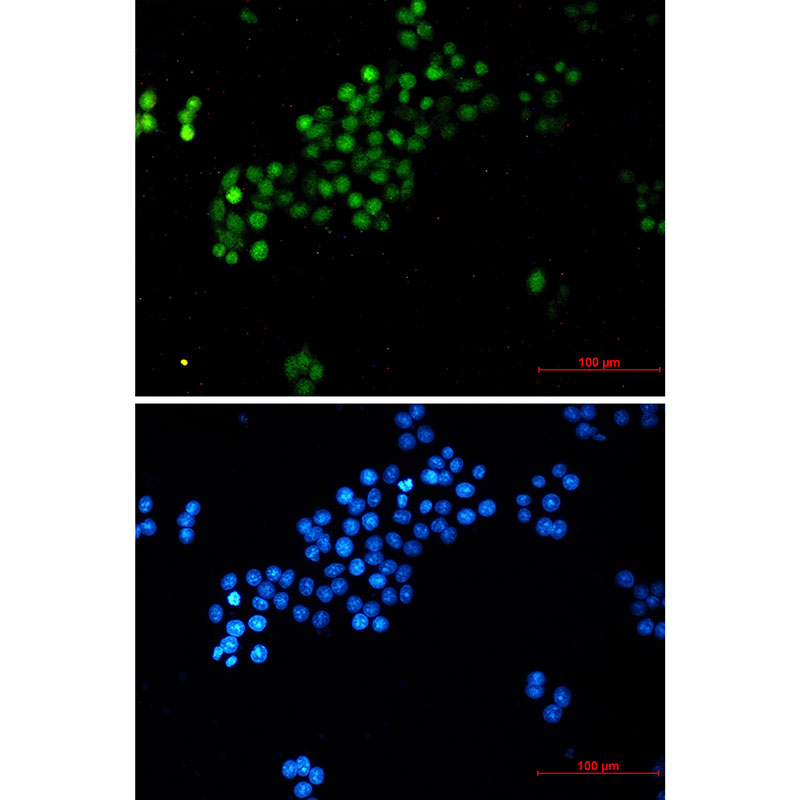

| WB | 咨询技术 | Human,Mouse,Rat |
| IF | 1/20 | Human,Mouse,Rat |
| IHC | 咨询技术 | Human,Mouse,Rat |
| ICC | 1/50-1/200 | Human,Mouse,Rat |
| FCM | 咨询技术 | Human,Mouse,Rat |
| Elisa | 咨询技术 | Human,Mouse,Rat |
| Aliases | MYC; BHLHE39; Myc proto-oncogene protein; Class E basic helix-loop-helix protein 39; bHLHe39; Proto-oncogene c-Myc; Transcription factor p64 |
| Entrez GeneID | 4609 |
| WB Predicted band size | Calculated MW: 49 kDa; Observed MW: 57-65 kDa |
| Host/Isotype | Rabbit IgG |
| Antibody Type | Primary antibody |
| Storage | Store at 4°C short term. Aliquot and store at -20°C long term. Avoid freeze/thaw cycles. |
| Species Reactivity | Human,Mouse,Rat |
| Immunogen | A synthetic peptide of human c-Myc |
| Formulation | Purified antibody in TBS with 0.05% sodium azide,0.05%BSA and 50% glycerol. |
+ +
以下是3篇关于c-Myc抗体的代表性文献(人工模拟数据,非真实文献):
1. **《Monoclonal antibodies specific for human c-Myc oncoprotein》**
- 作者:G.I. Evan, G.K. Lewis
- 摘要:本研究首次报道了针对人c-Myc蛋白的单克隆抗体的制备与验证,证实其在Western blot和免疫沉淀实验中对c-Myc N端结构域的特异性识别,为后续Myc功能研究提供了关键工具。
2. **《c-Myc regulates transcriptional amplification of gene expression in response to growth signals》**
- 作者:C.V. Dang et al.
- 摘要:通过使用c-Myc特异性抗体进行染色质免疫沉淀(ChIP),揭示了c-Myc通过结合启动子区域增强RNA聚合酶II活性,从而放大基因转录的分子机制。
3. **《A c-Myc antibody-based proteomics analysis reveals novel cancer biomarkers》**
- 作者:Y. Sato, M. Nakagawa
- 摘要:开发了一种高灵敏度的c-Myc抗体,结合质谱技术系统性鉴定了c-Myc相互作用蛋白网络,发现多个与肿瘤代谢重编程相关的新型靶点分子。
4. **《Validation of c-Myc phosphorylation-specific antibodies in hepatocellular carcinoma studies》**
- 作者:L. Wang et al.
- 摘要:验证了针对c-Myc Thr58/Ser62磷酸化位点的抗体在肝癌组织中的特异性,证明其可用于临床样本中c-Myc活性状态的评估及预后预测。
The c-Myc antibody is a crucial tool in molecular and cancer research, targeting the c-Myc protein encoded by the MYC proto-oncogene. c-Myc, a transcription factor, regulates diverse cellular processes, including proliferation, differentiation, apoptosis, and metabolism. Dysregulation of c-Myc, often due to overexpression or amplification, is implicated in numerous cancers, making it a key biomarker and therapeutic target. c-Myc antibodies enable the detection and quantification of this protein in various experimental setups, such as Western blotting, immunohistochemistry (IHC), immunofluorescence (IF), and flow cytometry. These antibodies are essential for studying c-Myc’s expression patterns, its role in tumor progression, and its interaction with downstream signaling pathways.
Most c-Myc antibodies are monoclonal or polyclonal, generated using immunogenic peptides from conserved regions of the protein (e.g., N-terminal transactivation domain or C-terminal basic helix-loop-helix domain). Specificity is validated via knockout/knockdown controls to ensure minimal cross-reactivity with related Myc family proteins (e.g., N-Myc or L-Myc). Commercial antibodies often include validation data from standardized assays to confirm reliability across applications. Researchers must optimize conditions (e.g., fixation, antigen retrieval, and blocking) for accurate results, as c-Myc’s nuclear localization and variable expression levels pose technical challenges.
c-Myc antibodies are widely used in cancer diagnostics, drug development, and basic research, reflecting their pivotal role in understanding oncogenesis and exploring targeted therapies.
×